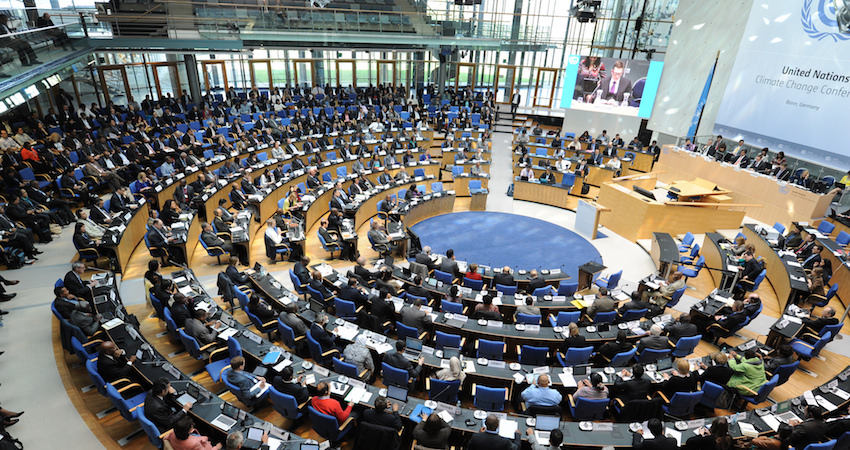Ministers from the EU and China must intervene to rescue talks on putting the Paris climate pact into action, a top EU negotiator said on Thursday.
Delegates at a meeting in Bonn, which closes on Thursday evening, accused China and other emerging economies of reopening divisions between rich and poor countries – while wealthy countries refused to meet demands on climate finance.
Elina Bardram, head of the EU delegation, said attempts to write different rules for rich and poor countries into the Paris Agreement were a “recurring theme”.
Climate ministers from the EU and China are set to meet at least twice this year in the lead up to a major summit in Katowice, Poland in December – billed as the most important since the Paris deal was struck. Bardram said their high-level political intervention was needed to resolve the issue.
Fights over differing responsibilities and money mean the past fortnight has seen stuttering progress on writing the rulebook that will govern the accord. Extra talks have been scheduled in Bangkok in September. Governments are straining to finalise the rules at the Katowice talks.
Climate Home News found Gebru Jember Endalew, an Ethiopian who leads the bloc of least developed countries, in the cafeteria, while upstairs representatives of nearly 200 countries debated how to unbind the stalemate.
After two weeks of talks, the level of progress was “not something to be proud of”, he said.
UN climate chief Patricia Espinosa called progress “satisfactory… but we have to be very, very clear that we have a lot of work in the months ahead”.
The co-chairs overseeing the negotiations on the rulebook are set to leave Bonn with formidable homework: to whittle down hundreds of pages of informal notes to something countries can debate in the Thai capital.
They need to simplify the many divergent positions without favouring – or appearing to favour – any one bloc over another. One of the co-chairs, Jo Tyndall of New Zealand, told Climate Home News: “There has got to be a bit of a step change, but it has got to be one the process can bear.” Without that, she said, “we’d probably need another year”.
Sunday talanoa: climate negotiators ‘talk to each other like people’
The Bonn meeting has been marked by a standoff over the supply of money to poor countries to help them cope with climate change.
Looming in the background is the fight over ‘bifurcation’. This is the division between the responsibilities of the rich and poor world that was agreed in a 1992 UN climate convention. One of the priorities for wealthy countries in the Paris Agreement was to move beyond a two-tier approach, getting emerging economies like China, Brazil and India to take more responsibility.
According to the developed world, the Paris deal changed the dynamic of global climate diplomacy. EU negotiator Elina Bardram said the division based on 1990s income levels was “not of this world anymore”. Li Shuo, from Greenpeace East Asia, described that position as: “We are moving into a new house and we want to abandon the old furniture.”
But high emitting middle income nations do not want let industrialised countries off the hook for their polluting history.
Now they are pushing to return elements of the original convention to the rules of Paris Agreement. The deal does contain ambiguity on this issue, opening the door to a political fight. Observers predict that when talks reconvene in Bangkok, China and Saudi Arabia will make aggressive attempts to keep strict divisions between rich and poor in the text.
No US, Chinese or Saudi representatives would speak to CHN. Meena Raman, of the Third World Network, said: “The story of climate violence is full of villains who for decades have grown rich off their polluting activities. They bear a historical responsibility – and they owe the rest of the world a debt.”
Report: One-sided dialogue as rich countries sit out talks on climate loss
Meanwhile, the poorest and most vulnerable countries just want all big emitters, regardless of their history, to act.
“Some parties are bringing back some issues that were closed in Paris, but we will be guided by the Paris Agreement,” said Ethiopian diplomat Endalew. He said the US intention to withdraw from the deal had been a “major factor” that may have emboldened China.
“It creates a kind of mistrust. The momentum which has been created in Paris was: we all will be leaders in the process, whether you are developed or developing,” he said. “But the US withdrawal immediately after the Paris Agreement has contributed a lot for parties to reconsider and are kind of looking backward.”
Wael Aboulmagd, who chairs the a huge developing country bloc that spans China and the poorest countries, told CHN he did not want to see a return to the “tired issues that were dealt with before Paris”.
Nevertheless, Li, who is close to the Chinese delegation, said bifurcation was likely to be pushed by some emerging economies during the Bangkok talks. But he said it was an “extreme position” being used to gain leverage. “I think everybody understands that there won’t be any bifurcation [in the rulebook],” he said.
